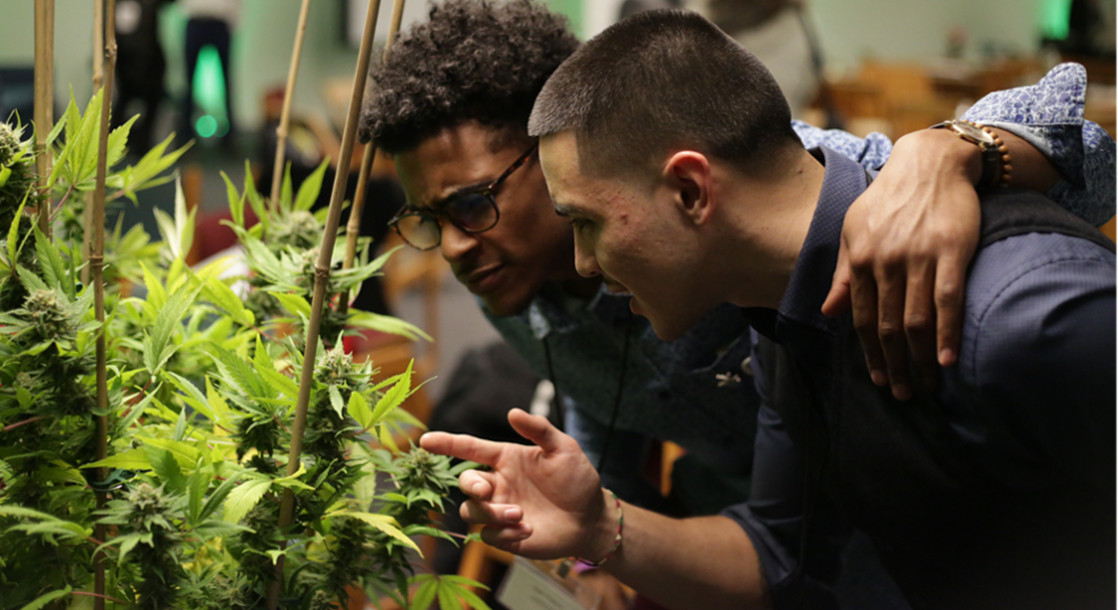All photos courtesy of Nadir Pearson.
Dropbox, Facebook, and Microsoft. These are well-known companies with enough capital to power economies, and yet all were invented by students in a dorm room. Mark Zuckerberg created a $500 billion-dollar company that revolutionized how the world engages with itself (for better or worse), all while in school. In the wake of the Parkland shootings, there has been reinvigoration among American youth, who are engaging in dedicated activism to bring real change to our society. In all of history’s most consequential movements and paradigm shifts, young people have contributed their active spirit to spark innovation.
This should be no different in the social revolution of cannabis legalization, especially when college campuses are vital hubs for education and research. When we think about empowering the next generation of cannabis activists and industry leaders, education should be at the front of people’s minds. There is no question the old maxim “knowledge is power” still has universal relevance. Colleges like UCLA, Northern Michigan University, the University of Vermont, and Harvard have committed at least some of their resources to shine light on the shadowy stigma that lingers around cannabis. Still, youthful innovation in the cannabis space is far from where it should be, though it certainly exists.
When we talk about the growing need for student innovation in the cannabis movement, we must consider the wide scope of possible career paths that align with subjects taught in higher education. From chemistry to economics to public policy, students are already pursuing degrees from which the cannabis sector can benefit. ProVerde Labs, a medical marijuana testing facility in Massachusetts, is currently seeking applications for a chemist to join their operation. The position (as it should) requires a bachelor’s degree in chemistry. Besides colleges and universities, there are no other institutions that could grant this qualification.
The cannabis industry has an increasing need for credentialed professionals, and university students are best poised to join the workforce. College is the transitional stage from student to professional. For cannabis companies, working alongside such institutions would give them access to recruiting the best young talent in relevant fields, while legitimizing themselves as progressive employers in the process. Despite legal concerns around cannabis, there are opportunities for students under 21 to work in the industry as well. Writing this very article is something anyone well-versed in the cannabis space could do from anywhere, for that matter.

Brown University's chapter of SMART, founded by author Nadir Pearson (lower-right).
At Brown University, I founded the Student Marijuana Alliance for Research & Transparency (SMART), a college cannabis community focused on getting students educated about cannabis while providing a bridge for industry professionals to recruit top, young talent. Now that SMART is expanding to other colleges like Northern Michigan University (home to the first-ever weed degree) and Southern Illinois University-Carbondale, we have had to find ways to adjust our approach to the differing campus climates of our chapters. Still, the major key to furthering cannabis on college campuses is leading with a harm reduction approach that focuses on responsible cannabis consumption. Even if colleges are starkly opposed to comprehensive academic programs, they must acknowledge the widespread use, especially if they are truly concerned about the well-being of their students. Once colleges implement responsible consumption education, it normalizes discussions surrounding cannabis and can ultimately lead to more extensive educational initiatives.
Universities are mainly hesitant to join the green rush because they are bound by the fear of losing their federal funding. Due to the federal prohibition on cannabis (despite overwhelming public opinion supporting national legalization), the United States is a patchwork of differing laws around the plant. States like Rhode Island and Pennsylvania only have medical marijuana, while forerunners like California and Colorado claim both medical and adult-use cannabis. Each state is grappling with their own unique political circumstances when considering questions of cannabis reform, but even in states where marijuana remains completely illegal, there is no law that stands against the education of students.

Data source: Monitoring the Future study, 2017
A reasonable concern for universities is ensuring their students are not put in physical jeopardy. The body of scientific research that has found cannabis to be hundreds of times safer than alcohol speaks volumes to the contrary. Virtually every college holds a responsible consumption portion of their new student orientations that involves alcohol, despite the fact that freshman in college are well under the legal drinking age. The same should be done for cannabis, especially when nearly 40 percent of college students have consumed cannabis in the last year.
The legal progress made in our state by state cannabis laws has sparked conversations all over the country, and colleges are realizing they must address an increasingly likely future for our society. Grassroots student initiatives will be the catalyst for universities and colleges (even where cannabis remains completely illegal) to acknowledge the demand for trusted cannabis education.
Facilitating opportunities with plant-touching canna-businesses certainly gets trickier when it comes to college students. Yet companies like Mammoth Incorporated, a licensed cultivator in Rhode Island, are already taking the lead, by giving tours of their facility to canna-curious students from Brown University. Positions in social media, marketing, and administrative roles can alleviate the stress of underage employees in plant-touching businesses. At bare minimum, Mammoth Inc. opening its doors to students is a precedent for how colleges can partner with their local cannabis businesses to educate. The value exchange balances like yin and yang.
Moreover, universities have profound resources dedicated to research that could surely help quell public skepticism. Harvard has already taken steps in this direction at their McLean Hospital, which is home to Marijuana Investigations for Neuroscientific Discovery (MIND). Unfortunately, this initiative that was started in 2014 has been funded by a generous $500,000 private gift. Universities typically receive federal backing for their research, but for cannabis this is simply not the case. Undergraduate students are not typically involved in MIND’s research, lead by Harvard professor Dr. Staci Gruber. Regardless, knowledge of the biological effects of cannabis should not be information privy only to those pursuing graduate degrees in medicine. Cannabis research is the new frontier of the medical field, and it’s time the latest technological resources are used to innovate even undergraduates’ understanding of the plant.
SMART members at the fourth annnual New England Cannabis Convention, March 2018.
College cannabis education will inform the entire student population beyond marijuana myths, destigmatize cannabis use, and empower youth with the historical insights necessary to reverse injustices — especially those faced by communities of color — caused by the War on Drugs. The better informed students are, the easier it will be to develop grassroots initiatives that demonstrate to professors and administrators alike that cannabis education can be an elite, scholarly activity.
This past November, Boston University (BU) was recently home to a landmark cannabis start-up competition hosted by the BUzz Lab, BU’s center for entrepreneurship. The event was held at their Questrom School of Business in conjunction with GreenLion Partners, a cannabis business strategy firm whose founders Jeffrey Zucker (’10) and Mike Bologna (’10) both earned their MBAs at Questrom. Each start-up team consisted of at least one student from Boston University, while others like GrowPro, a low-cost plant sensor system for growing cannabis at home, and Movez, a social event platform for the cannabis industry, were completely comprised of students. With a $10,000 prize to serve as seed capital for the winning pitch, this competition is a strong example of the synergy that lies between passionate scholars and the cannabis industry.

Author Nadir Pearson with the winners of BUzz Lab's cannabis start-up competition.
Cannabis already has shining examples of young entrepreneurs running well-oiled businesses. Luke Shepter was a student at Boston College during the early stages of founding i-Rollie, an innovative accessories company that trademarked the iPhone case rolling tray. Shepter and his friend Joe Khoury (who attended the University of Massachusetts Amherst) ran their business out of Luke’s dorm room before expanding to bigger offices.
Stache Co. is a clothing brand with discreet storage for cannabis consumers owned by four young entrepreneurs out of Massachusetts. Their enterprise is a creative niche that circumvents any legal concern regarding marijuana itself.
The Stache Co. team at the fourth annnual New England Cannabis Convention, March 2018.
Hope Wiseman, at the age of 25, is the youngest dispensary owner in the country and only graduated from Spelman College in Atlanta, Georgia four years ago. Regardless, whether students choose to endeavor in plant-touching businesses or ancillary enterprises, education will be at the foundation of their cannabis expertise. By bringing in real cannabis professionals with deep experience in the industry, college communities will begin to fully realize that the being apart of the cannabis community is the farthest thing from being unsuccessful, unmotivated couch potatoes.
The opportunity to get the brightest young minds thinking seriously about legal cannabis has the potential to shift our society for the better. Your average student does not know that hemp can be turned into concrete, or that it’s an eco-friendlier alternative to paper, plastics, oil, and cotton. Many young people still don’t know that “marijuana” was a name exploited by the United States government to scare citizens into believing that cannabis is an addictive drug with dangerous social consequences. Colleges and universities have a duty as leaders in scholarship to prepare the next generation of leaders, no matter their field of study. Student innovation in the cannabis sphere will not just benefit students or academic institutions, but could translate into technologies and innovations that change our everyday lives.













